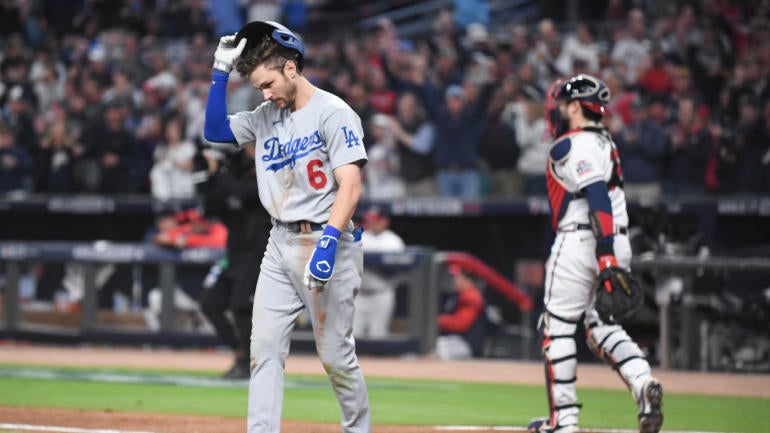
Two games, two walk-offs, and a 2-0 series lead for the Atlanta Braves over the Los Angeles Dodgers in the 2021 NLCS. The Braves are only the second team ever to win Games 1 and 2 of a League Championship Series on walk-offs, joining the 1969 Baltimore Orioles. Austin Riley and Eddie Rosario provided walk-off singles just like Paul Blair and Curt Motton for the O's back in the day.
"We got big hits," Braves manager Brian Snitker said following Game 2. "I mean, all of them. [Rosario], Joc (Pederson), Austin. I mean, that's what it takes to win these games, and I mean, they're hard games to win, but [Rosario] had a really nice evening."
For the Dodgers, some perspective is in order: Los Angeles hasn't hit, the bullpen has blown up twice, they've made several dopey mistakes on the bases and in the field, and yet Games 1 and 2 still came down to the final at-bat. You can slice it both ways (Freddie Freeman won't keep striking out forever, for example), but the Dodgers were in both games right to the very end.
That said, two losses are two losses, and a 2-0 series deficit is daunting. Historically, teams that took a 2-0 lead in a best-of-seven went on to win the series 84 percent of the time. The Dodgers erased a 2-0 deficit (and a 3-1 deficit) to beat the Braves in last year's NLCS, so this is a been here, done that situation. Beating an 88-win team four times in the next five games won't be easy though.
"I think two innings -- obviously they have had two big innings to take the lead -- and the series could be flipped," Dodgers manager Dave Roberts said after Game 2. "So I just, like I said before, our guys are prepared to play through October."
The NLCS now shifts to Dodger Stadium where the Dodgers have won 10 of their last 11 games against the Braves, including sweeping a three-game series in late August and early September this year. Here are five things that must happen for Los Angeles to make a comeback from down 2-0 to beat the Braves for the second straight postseason.
1. Buehler dominates in Game 3
Los Angeles lost Games 1 and 2 to the Braves in last year's NLCS, then came out and scored 11 runs in the first inning in Game 3. That's obviously an outlier and not something anyone should count on happening again. What the Dodgers also received in Game 3 was a great start from Julio Urías. He allowed just one run in five innings after being staked to that huge lead.
The path to an NLCS comeback starts on the mound with Walker Buehler shutting the Braves down in Game 3, giving the offense some time to build a lead and breath a little. Buehler is a Cy Young candidate (if not the favorite) and he pitched well in his lone start against the Braves during the regular season, holding them to two runs in seven innings on Aug. 31.
Buehler will start Game 3 with two extra days of rest after starting Game 4 of the NLDS on short rest last Tuesday. He was very good in that start, though the Dodgers limited him to 71 pitches. Buehler should be good for a full start in Game 3, and he's proven himself to be a big-game pitcher (2.50 ERA in 13 career postseason starts). The Dodgers need another gem Tuesday.
2. The RISP tide must turn
Two games into the NLCS, the Dodgers are 2 for 18 with runners in scoring position, and Chris Taylor has both hits. He is 2 for 3 with runners in scoring position and the rest of the Dodgers are 0 for 15. They've turned 25 baserunners into only six runs in these two games against the Braves. Obviously no comeback will happen without that improving.
"I think in this in that particular instance it's an approach thing," Roberts said following Game 2. "It's an approach thing and I think that certain times in scoring position we're expanding too much."
The Dodgers are a home run offense (their 237 homers were fourth most in MLB), yet eight games into their postseason, they've hit only seven home runs. The Braves are a home run team too (they hit 239 homers this year) and they have only six homers in six postseason games, though they were able to get that big non-homer hit in Games 1 and 2. The Dodgers are still waiting.
Interestingly enough, the Dodgers have taken a more aggressive approach this postseason. During the regular season their offense had the fourth-lowest swing rate (45.4 percent) and the ninth-lowest strikeout rate (22.9 percent) in baseball. Through eight postseason games they've swung at 49.4 percent of the pitches they've seen, and their strikeout rate is down to 21.7 percent.
"We are," Roberts said when asked whether the Dodgers are intentionally being more aggressive following Game 1. "... Just trying to win and fight, win pitches, and give ourselves a chance. You give yourself a chance, then it's better than punching. So I thought we've been doing a much better job of that."
The Dodgers had six two-strike hits against Max Fried in Game 1 -- Fried held hitters to a .160 batting average in two-strike counts during the regular season -- though they were scattered, and didn't lead to many runs. They struck out 10 times in Game 2 yet scored four runs, their third highest total in eight postseason games, thanks largely to nine -- nine! -- walks.
There's something to be said for having the willingness and ability to make adjustments, particularly when the stakes are highest in the postseason, though perhaps the Dodgers should revert back to the ultra-patient approach that worked so well in the regular season? Maybe the walks and strikeouts in Game 2 are an indication that is already happening. We'll see.
Either way, the Dodgers have done good work creating opportunities to score in the NLCS. They've gone down 1-2-3 only five times in 18 innings. At some point they need to convert those opportunities into runs if this NLCS comeback is going to happen. The Braves are damn good and they deserve credit for keeping the Dodgers off the board, but continually tipping your cap is no way to win a series.
3. The Turners have to be better
It's a minor miracle the Dodgers are four wins away from their fourth pennant in five years with Justin Turner and Trea Turner being as unproductive as they've been this postseason. The Turners are a combined 10 for 63 (.159) in the playoffs, and although they had three hits in Game 1, they weren't scalded. Two were ground balls up the middle and one was a little flare the other way.
What we have seen from the Turners is entirely too much of this:
Trea fouled away a hittable fastball over the plate, then expanded the zone and swung at pitches off the plate for strikes two and three in a crucial spot. The Dodgers as a team have collectively missed a lot of hittable pitches out over the plate this postseason, though Turner is an MVP-caliber player, and when he has a bad at-bat and a bad postseason, it's more noticeable.
"Certainly when guys are struggling it's a combo. It's the chase, and when you do get pitches to handle you're not finishing the at-bat. So I think that's what's happening to Justin," Roberts said prior to Game 2. "I think a lot of our guys are a little bit caught in between on velocity versus spin. So it's more about just the mindset of being aggressive in your zone and what you're good at, and everything outside of that, try not to offer at it."
In the ninth inning of Game 2 Turner (Trea, not Justin) hit a ball to the warning track -- Statcast says it would have been a home run in 26 of the other 29 ballparks, including Dodger Stadium -- which may be a sign he's coming out of it. Turner (Justin, not Trea) was on the bench in Game 2 with a "stinger" in his neck, and perhaps the neck issue explains his poor postseason.
At this point though, the Dodgers need more than signs Trea is coming out of it and potential injury excuses for Justin. It is a results-based business and a results-based time of year, and neither Turner is providing results. I wouldn't say it's impossible for the Dodgers to win the World Series with the Turners playing like this, though it is improbable.
I'm usually not a big "shake up the lineup" guy, though I wonder whether it's worth putting Trea back in the leadoff spot. He's been hitting third since early September and has been very good in that spot (.356/.412/.615), but maybe putting him back atop the lineup gets him more locked in on his approach, and allows him to focus on setting the table rather than driving in runs. It's worth considering, if nothing else.
"I feel like I'm not doing enough," Trea said after Game 1. "I feel like I've been not aggressive enough and I feel like I swing and miss sometimes, but when I get two strikes I'll battle. But for me I need to take those chances. I need to be aggressive and I think when I'm aggressive I'll take balls and swing at strikes and I'll do what I need to."
Wherever they hit in the lineup, there's almost no path to another championship without the Turners being better moving forward. That 10 for 63 is in the books. There's no changing that. Being more productive in Game 3 and beyond has to be the focus. Good players slump all the time, and the Turners are slumping at a bad time for the Dodgers.
4. Lean on the top bullpen arms more
Count me among the Urías first-guessers in Game 2. To recap: Roberts went to Urías with a two-run lead in the eighth inning, three days after his 59-pitch relief outing in NLDS Game 5 and three days before his scheduled start in NLCS Game 4. Urías allowed hits to three of the first four batters he faced, including Riley's loud game-tying double. The two-run lead evaporated in six pitches.
"We talked about it before the series and he was available last night if it came to the situation. It didn't," Roberts said after Game 2. "He hadn't thrown a bullpen and he was the best option at that point in time. He was prepared for it. It was a perfect spot for him, and getting him through that 8th to go to Kenley (Jansen) to finish the game."
Urías has plenty of bullpen and big-game experience. The issue wasn't putting him in an unfamiliar position. The issue was whether it was in fact "a perfect spot for him" given:
- Blake Treinen threw only nine pitches in the seventh inning and there was an opportunity to use him for more than three outs. Alas, Treinen wasn't double switched in, so his lineup spot led off the top of the eighth inning.
- Max Scherzer admitted his "arm was dead" in Game 2 following his relief appearance in NLDS Game 5 three days ago. Urías threw 59 pitches in that game. He couldn't have felt 100 percent in Game 2.
- Roberts has a tendency to shoehorn starting pitchers into postseason relief appearances even when it's not necessary. How many times have we seen him do it with Clayton Kershaw over the years?
The Dodgers really seemed to want the left-on-left matchup against Rosario and Freeman in that eighth inning, which is understandable. But when your best options are Urías on his throw day or a rookie with 19 2/3 big league innings under his belt (Justin Bruihl), it's probably best to stick with Treinen, or go to Jansen against the top of the order and figure out the ninth later.
"I just think that if you're talking about performance, experience -- nothing against Justin -- but when you have a choice between him and Julio, I think it's pretty clear who I was going to choose," Roberts said when asked about possibly using Bruihl in the eighth inning following Game 2.
Even beyond Urías, Brusdar Graterol was brought in to start the ninth inning with the score tied 4-4, and it wasn't until the situation was dire that Jansen emerged from the bullpen. So, the case can be made Roberts went with his second-best option in the eighth inning (Urías over Treinen or Jansen) and ninth inning (Graterol over Jansen) in Game 2, and it cost the Dodgers.
I was totally cool with using Scherzer to close out NLDS Game 5. That's a win-or-go-home situation and the Dodgers' best options at that point where a second inning from Jansen, or Joe Kelly or Alex Vesia. Kelly and Vesia have been really good! But I'd hitch my wagon to the future Hall of Famer in that situation eight days a week and twice on Sunday.
Game 2 was not an elimination game, and I didn't like using Urías in relief not only because of the game situation, but also because it could throw a wrench into his Game 4 start. There is still a lot of series to be played, and while the current game is always the most important game in October, you do have to manage to win four games rather than one, especially early in the series.
"No, no. Not at all. Not at all," Roberts said when asked whether the Game 2 appearance will impact Urías' availability in Game 4. "That's why he was ready, available [Saturday] -- didn't throw a side -- to prepare for one of these two games."
Games 3-5 (if there is a Game 5) will be played on three consecutive days, so pushing your top relievers won't be as easy the next few days. That built-in rest day isn't right around the corner. That said, the Dodgers are in a bind, and if they need to use Treinen and Jansen more than three outs each to win Game 3, so be it. Stop trying to steal outs with starters in relief or lesser relievers.
5. Get a little lucky
The Dodgers are good enough to beat the Braves four times in the next five games on talent alone. It wouldn't hurt to get a little luck along the way though. The Dodgers could use a few bounces going their way, a few calls going their way, and things to break their way in general. The best teams are good and lucky, and the Dodgers haven't had any good luck two games into the NLCS. One fortunate hop can tip the scale in their favor.
"come" - Google News
October 19, 2021 at 07:16AM
https://ift.tt/3ja8PGL
2021 MLB playoffs: Five things that must happen for Dodgers to come back from their NLCS deficit vs. Braves - CBS Sports
"come" - Google News
https://ift.tt/2S8UtrZ
Shoes Man Tutorial
Pos News Update
Meme Update
Korean Entertainment News
Japan News Update
Bagikan Berita Ini




















0 Response to "2021 MLB playoffs: Five things that must happen for Dodgers to come back from their NLCS deficit vs. Braves - CBS Sports"
Post a Comment